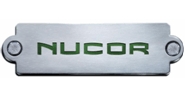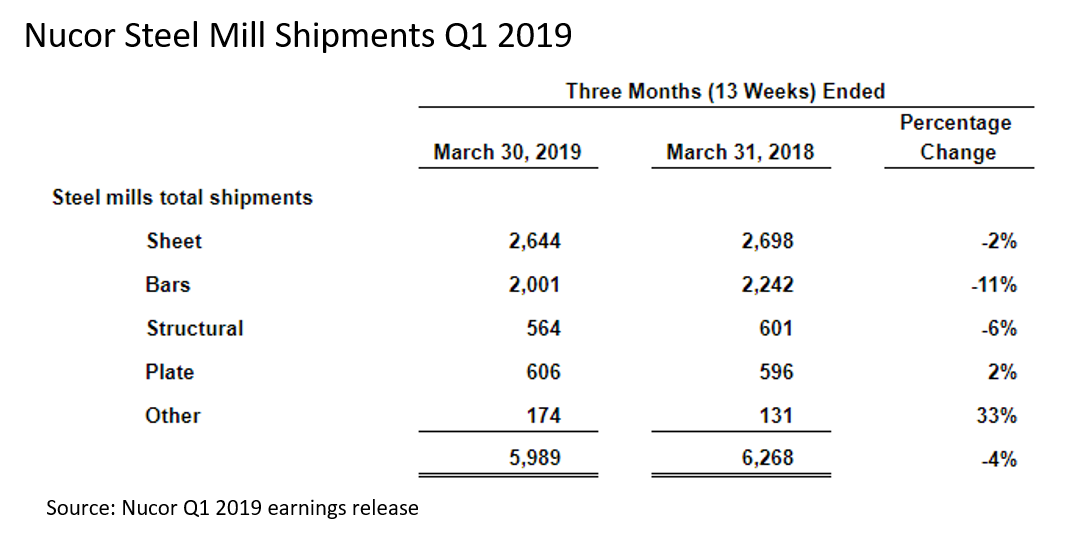Market Segment

April 23, 2019
Nucor Quarterly Sales Impacted by Lower Steel Prices
Written by Sandy Williams
Nucor announced net income of $501.8 million for the first quarter of 2019, a 22 percent decrease from income of $646.85 million in the fourth quarter. Net sales slipped 3.0 percent sequentially to $6.10 billion from the fourth quarter as the average sales price per ton dipped 4.0 percent.
The drop in earnings was expected due to lower average selling prices and margins for sheet products, said Nucor. Challenging winter conditions also impacted sales by delaying shipments to Nucor’s construction customers.
Shipments to outside customers increased 1.0 percent sequentially to 6.77 million tons. Total steel shipments for Nucor increased 2 percent.

The average scrap and scrap substitute cost per ton used during the first quarter of 2019 decreased 2.0 percent from the fourth quarter to $352.
The raw materials segment experienced margin compression in the first quarter, primarily in Nucor’s DRI businesses, due to declining average selling prices. Nucor’s Louisiana DRI plant will have a 60-day outage starting in mid-to-late August to make repairs to the furnace vessel and control system on the refractory. Early next year it will undergo another outage while efficiencies are improved in material handling.
Looking ahead, the company expects earnings in Q2 to be similar to the first quarter of 2019. Weakening margins for sheet and plate mill products are expected to be offset by improving margins for structural and bar mill products. Fabrication should see a seasonal improvement in the nonresidential construction market. Further margin compression is expected in the raw materials segment.
Nucor sees growth evident in 21 of the 24 market sectors in which it participates. Power transmission is in decline due to completion of major projects and softening is expected in the OEM and auto industries. Nucor is estimating auto sales will only reach the 16.8-16.9 million level this year, but the company will take a “larger piece of the smaller pie.” Currently, shipments to the auto industry total 1.6 million tons annually, but that is expected to increase to about 2 million tons per year by the end of 2019.
Expanding on the outlook for shipment volumes for 2019, Ferriola noted that although demand is strong and service centers’ inventory is diminishing, there is still a lot of inter-sale between service centers. Customers hedge-bought at the end of 2018 because of Section 232 concerns and other issues and are still working their way through that inventory. “If you look at the basics,” said Ferriola, “demand is good, imports are down, so at some point volume will start to pick up in the second half of the year.”
Price decline on the flat rolled side is due, in part, to the entrance of new steel mills into the market. When you start up or restart a mill, there are issues with reliability and delivery that result in lower pricing, which puts a drag on the market, said Ferriola.
He added that higher pricing does not always follow volume demand. If demand is strong and scrap prices are going down, even if steel prices go down, metal margins will still be good. “We’re going to have a really good year,” said Ferriola.
Expansion Projects
During the earnings call, Ferriola noted 10 projects in the works at Nucor, six of which will be operating this year. Among the projects are the specialty cold roll mill in Arkansas, which came on line in March; Nucor Marion’s inline rolling mill, scheduled for start-up in the third quarter; and an expanded galvanizing line at Gallatin, scheduled to begin operation in August.
The JFE joint venture galvanizing line in Mexico, the merchant bar mill expansion in Illinois, and the rebar mill in Missouri will be operational in late 2019. Construction has commenced on the rebar micro mill in Florida with start-up expected in mid-2020. Operations are expected to commence in 2022 at Nucor’s new plate mill planned for Brandenburg, Ky.
Ferriola stressed that all of Nucor’s long-term strategies for profitable growth are both disciplined and sustainable and tied to return on equity, performance and value creation.







